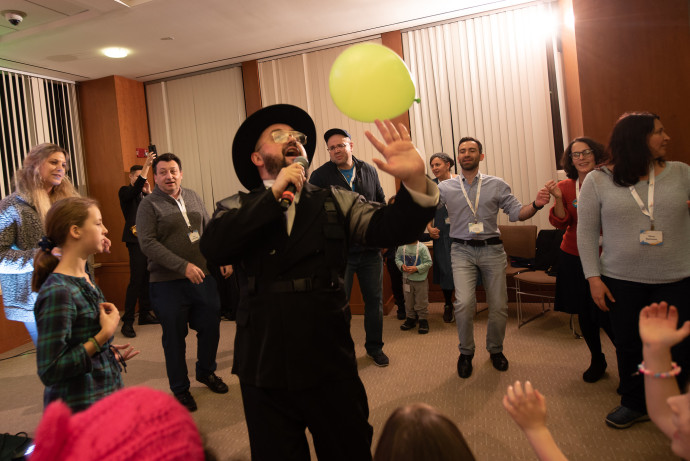Just days before the US midterm elections and amid growing concern about the conflict in Ukraine, a recent gathering in Boston of Jews from the former Soviet Union was dominated by talk of the war and ways US politics might affect its outcome.
The all-day event on Oct. 23 at Boston University’s Hillel was organized by Limmud FSU, which holds Jewish learning conferences around the world for Jews from the former Soviet Union.
“We are at a very historic moment,” said Jewish political consultant Lincoln Mitchell, a commentator on democracy and governance issues in the former Soviet Union.
Elana Broitman — who immigrated to the United States at age 10 from Odessa and now, two generations later, is a senior vice president of public affairs at the Jewish Federations of North America — spoke about her group’s priorities for helping in Ukraine.
Jewish Federations already has raised over $73 million in Ukraine-related aid this year and has helped resettle Ukrainian refugees in 12 communities around the country, including New York, Chicago and Youngstown, Ohio.

“We have to focus on the most impactful priorities,” Broitman said. “What we’re lobbying for are three things: overall Ukraine aid, refugee resettlement in the US, and extension of the Lautenberg Amendment, which provides for a particular program for religious minorities.”
Despite the geopolitical challenges, much of the Boston conference focused on celebrating. Participants danced to the Hebrew and Yiddish melodies of Israeli vocalist Vladi Blayberg.
Actress Ronit Asheri, who starred in the Netflix series “Unorthodox,” talked about her upcoming series, “Transatlantic,” which tells the story of a rescue network in wartime France that helped thousands of Jewish refugees escape the clutches of the Nazis. There was a session on the challenges of creating art during wartime, and a children’s theater program for kids.
In all, over 150 people attended the festival, which was held in English and Russian.
First-ever Limmud FSU conference in Boston
“We are very happy to open our first-ever Limmud FSU conference in Boston,” said Limmud FSU’s founder, Chaim Chesler. “We’ve been wanting to do this for five years, and now we’re finally fulfilling our dream.”
Among Limmud FSU Boston’s key supporters are the Conference on Jewish Material Claims Against Germany, Genesis Philanthropy Group, the Jewish National Fund-Keren Kayemet LeIsrael, Combined Jewish Philanthropies of Greater Boston (CJP), Wilf Family Foundations and others.
Since Limmud FSU’s first conference in 2006, the group has hosted more than 80 events worldwide, drawing over 80,000 participants. The organization’s co-founder is Sandra Cahn, Matthew Bronfman is its chairman and Aaron Frenkel is president.
In November, Limmud FSU will be going to Australia, with festivals in Sydney and in Melbourne. Limmud FSU will also hold its annual event in Israel in December, with an event in Tiberias expected to draw more than 1,000 participants.
The event in Boston covered topics from Soviet history and the Holocaust to Israeli politics. Mark Novikov, publisher of a blog for Israelis with roots from the former Soviet Union, spoke about the complexities of Israel’s upcoming elections.
Pam Cohen, a longtime Chicago-based activist for Soviet Jewry in the 1970s and 1980s, discussed her new book, “Hidden Heroes: One Woman’s Story of Resistance and Rescue in the Soviet Union.”
Rabbi Shlomo Noginski, who in July 2021 was stabbed eight times near his synagogue in the Boston suburb of Brighton, spoke of his experience with antisemitism.
Ukrainian-born IT consultant Julia Kotlyar Volkovich, a Limmud FSU veteran, said Boston was an ideal place for a gathering focused on Jewish learning for Jews from the former Soviet Union.
“Boston is a global educational hub, and many Jews in our FSU community work in academia,” she observed. “There’s no place like it anywhere else in the world.”
“Boston is a global educational hub, and many Jews in our FSU community work in academia, there’s no place like it anywhere else in the world.”
Julia Kotlyar Volkovich
This article was sponsored by and produced in partnership with Limmud FSU, which nurtures open, pluralistic, dynamic learning platforms across the world for Jews of all ages and backgrounds with roots in the former Soviet Union, while embracing the Jewish intellectual, cultural and religious traditions grounded in this shared experience. This article was produced by JTA’s native content team.
